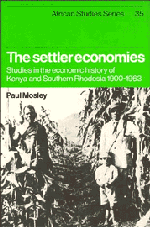Book contents
- Frontmatter
- Contents
- List of maps
- List of tables
- List of figures
- Preface
- A note on currency
- Abbreviations
- Kenya and Southern Rhodesia: principal place names
- 1 Introduction
- 2 The political constraints on economic behaviour
- 3 African agricultural development
- 4 The labour market
- 5 European agriculture
- 6 Secondary industry
- 7 Conclusions
- Notes
- Bibliography
- Index
- Frontmatter
- Contents
- List of maps
- List of tables
- List of figures
- Preface
- A note on currency
- Abbreviations
- Kenya and Southern Rhodesia: principal place names
- 1 Introduction
- 2 The political constraints on economic behaviour
- 3 African agricultural development
- 4 The labour market
- 5 European agriculture
- 6 Secondary industry
- 7 Conclusions
- Notes
- Bibliography
- Index
Summary
INTRODUCTION
European agriculture in the settler economies is striking in that it does not conform to the principle, stated for example by Chenery (1960 (D3)), that agriculture declines in relative importance as economic development proceeds. In 1925 the share of European agriculture in Southern Rhodesian national income was estimated at 15.1 per cent; in 1955, after thirty years of rapid economic growth, it was still 14 per cent. In Kenya European agriculture's share of total domestic exports in 1926 (we have no national income data) was 62.7 per cent; in 1961 the figure was 64.8 per cent. However, within the sector there was a profound structural shift (Table 5.1) from a position in which maize occupied a predominant share of total acreage in the 1920s, to a position at the beginning of the 1960s in which European agriculture was dominated by plantation crops.
No systematic description of the European farming economy covering the colonial period has to our knowledge been attempted, although there do exist a general historical survey of agriculture in Kenya with a bias towards the European sector (Cone and Lipscomb 1972 (D1)) and an economic survey of post-Second World War European farming in Southern Rhodesia (Dunlop 1971 (D2)). However, as a by-product of studies of policy-making, African agriculture and other topics, a stereotype of the white farmer has emerged, which threatens to become almost as widespread as once the stereotype of the ‘economically irrational African’ was in the settler economies themselves.
- Type
- Chapter
- Information
- The Settler EconomiesStudies in the Economic History of Kenya and Southern Rhodesia 1900–1963, pp. 170 - 194Publisher: Cambridge University PressPrint publication year: 1983



